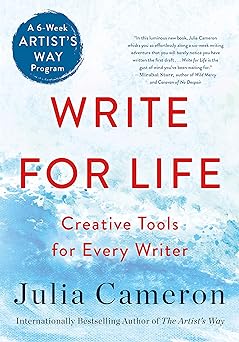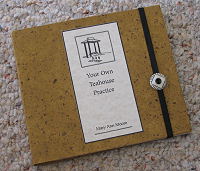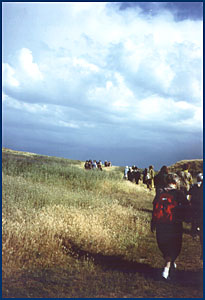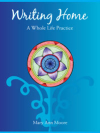 The title of Julia Cameron’s new book, Write for Life: Creative Tools for Every Writer (St. Martin’s Essentials, 2022) resonates with me as I lead women’s writing circles called Writing Life; we write from life and create writing lives for ourselves. And I’ve written a book I consider a writing companion and guide called Writing Home: A Whole Life Practice. I see writing as a (whole) life practice and as Julia Cameron does, I consider writing a spiritual practice.
The title of Julia Cameron’s new book, Write for Life: Creative Tools for Every Writer (St. Martin’s Essentials, 2022) resonates with me as I lead women’s writing circles called Writing Life; we write from life and create writing lives for ourselves. And I’ve written a book I consider a writing companion and guide called Writing Home: A Whole Life Practice. I see writing as a (whole) life practice and as Julia Cameron does, I consider writing a spiritual practice.
Julia Cameron’s Write for Life is called “A 6-Week Artist’s Way Program” as it relates to Julia’s The Artist’s Way published in 1992. I so appreciated that book and have read several of her books since in the Artist’s Way series as well as other books she has published on the theme of creativity.
I still have my original copy of The Artist’s Way: A Spiritual Path to Higher Creativity (Jeremy P. Tarcher/Perigee Books, 1992) and enjoyed seeing what I had written in pencil all those years ago in answer to the questions posed. I had marked in pen the portion at the end of the book entitled “The Sacred Circle.”
Julia wrote: “Drawing a Sacred Circle creates a sphere of safety and a center of attraction for our good. By filling this form faithfully, we draw to us the best. We draw the people we need. We attract the gifts we could best employ.”
I didn’t begin women’s writing circles in 1992 but I did gather with other writers regularly to write and share our work. I attended writing workshops when I could including a two-week retreat in North Vancouver called West Word IX. It was a women’s writing retreat, the last one in the series as it turned out, and I was in the fiction group led by Lee Maracle. I value solitude and I very much need to gather with others writers to write together and to share our work.
The two main tools of The Artist’s Way are Morning Pages and Artist Dates. Julia refers to both in Write for Life with an emphasis on Morning Pages. “Walking for Creative Health” is also added to this new book as well as to her books since The Artist’s Way. “Twice a week, or more often if you’d like to, take yourself on a solo phone-free, dog-free, friend-free, twenty-minute walk,” Julia suggests. You could walk out with a question and return with an answer.
Artist Dates are taking exploratory adventures on your own to have fun. Julia suggests once a week, two hours at a time, to give yourself some renewed energy and inspiration.
Since Julia began the practice of Morning Pages for herself, she has published more than forty books. It’s a practice of three pages of longhand writing on eight-and-a-half-by-eleven inch paper done each morning. The pages are “strictly stream of consciousness” Julia points out. You keep your hand moving and write down anything that comes to you.
The first page and a half is pretty easy and the second page and a half a bit more difficult as you keep writing. Those pages contain “pay dirt” Julia says.
Something added to Writing for Life is The Daily Quota. At the end of each chapter in the six-week Write for Life program, Julia asks if you’ve reached your “doable daily quota for your writing project.” She suggests two pages for prose and three pages a day for screenplays. She doesn’t mention poetry but I have sometimes taken on the challenge of writing a poem a day, particularly during April, Poetry Month, using a line of another poet’s poem to get me started.
If you want to complete a particular writing project, Julia says: “The key to productivity is regularity.”
In her first chapter, “Priming the Pump,” Julia refers to having supportive and safe companions she calls “believing mirrors.” As for a room of one’s own as Virginia Woolf proclaimed as a woman writer’s need, Julia suggests Morning Pages as a safe place to vent.
Julia has “writing stations” in her Sante Fe home so she writes in different forms in different locations. She makes notes on the couch in her exercise room for instance and writes prose in her library.
I was a fan of Julia Cameron right from the start, all those years ago, as she sees writing as a spiritual path. She says: “. . . as I retired from my ego’s need to be a brilliant author, my writing became more clear. No longer aimed at being impressive and brilliant, it aimed instead to be forthright.” Julia came to believe “that honesty and authenticity could capture my reader’s faith.”
She still has a reader in mind but not for those Morning Pages which Julia says “is like sending a telegram to the universe . . . Although we may not call it that, we have sent a prayer.”
In Week One, “Priming the Pump,” Julia deals with what could be stumbling blocks for writers: perfectionism, the inner critic, procrastination, and the “dailiness” of writing. There are “tasks” at the end of the weekly chapters and related to perfectionism is a series of lines for you to complete. They all begin with: “If I didn’t have to do it perfectly, I’d . . . “
There are also suggestions for dealing with your inner critic and “blasting through blocks.”
In the short essays in the book’s chapters, Julia usually describes the weather in Sante Fe and/or her state of mine. In “First Thoughts” included in Week Two “Begin Where You Are,” she describes the full moon with thick clouds obscuring it and the fact her dog Lily is restless. Although this is part of Julia’s essay, it could be something you could write in your Morning Pages. She does say: “My Morning Pages track the weather.”
I think beginning the day with writing what’s going on for you leads well into whatever writing project you’re working on. It could be that those feelings make their way into your piece of fiction, poetry or prose and it has all started with you. And as Julia says, with Morning Pages “we jot down our ideas. We do not strive to ‘think them up.’ “
I’m all for celebrating your achievements which is the subject of Week Six of Write for Life. You may want to take an all-day Artist Date as you may have a first draft of your writing project or are approaching that stage. If you dare to show your work to anyone at this stage, you can ask them to focus on the draft’s strength’s. That’s Julia’s suggestion and it’s a good one: “Tell me what works, and why.” As she says: “It is my experience that focusing on strengths amplifies those strengths. Focusing on weaknesses amplifies those weaknesses – not what you want to do.”
As I mentioned, there are questions and prompts among the “tasks” at the end of each week. For instance in Week Three, “Trust Your Process,” Julia suggests numbering one to ten and writing “What I’d really like to write about is . . . “ You could choose one topic from your list and write about it.
Under the heading of “Writing to Metabolize Life,” Julia suggest listing five emotionally charged topics or moments from your life and writing about one of them for five minutes.
While there are prompts such as the ones noted above, Write for Life isn’t going to give you ideas for keeping your memoir moving forward for instance. You’re going to have to rely on your Morning Pages for that or other guides that ask specific questions. Write for Life is a companion for the process of writing and honours one’s daily practice of writing for yourself with a view to writing something that you can later share with others.
If you haven’t read The Artist’s Way by Julia Cameron, I’d recommend starting there – or returning there. It’s the sort of book that you can read and follow over and over again.
And while I’m at it, I’ll let you know of my own writing guides.
The first two are presented in a digital format, available from the International Association for Journal Writing (IAJW). (Please note IAJW prices are in U.S. funds.)
 Writing as a Spiritual Practice: Your Own Tea House Practice
Writing as a Spiritual Practice: Your Own Tea House Practice
Have a look for a description and to order here.
 Writing to Map Your Spiritual Journey
Writing to Map Your Spiritual Journey
Have a look for a description and to order, here.
The following is a 344-page book in soft cover:
 Writing Life: A Whole Life Practice
Writing Life: A Whole Life Practice
You can have a look and purchase here. The price of $75 Canadian includes postage in Canada and a free copy of my poetry book: Fishing for Mermaids.
